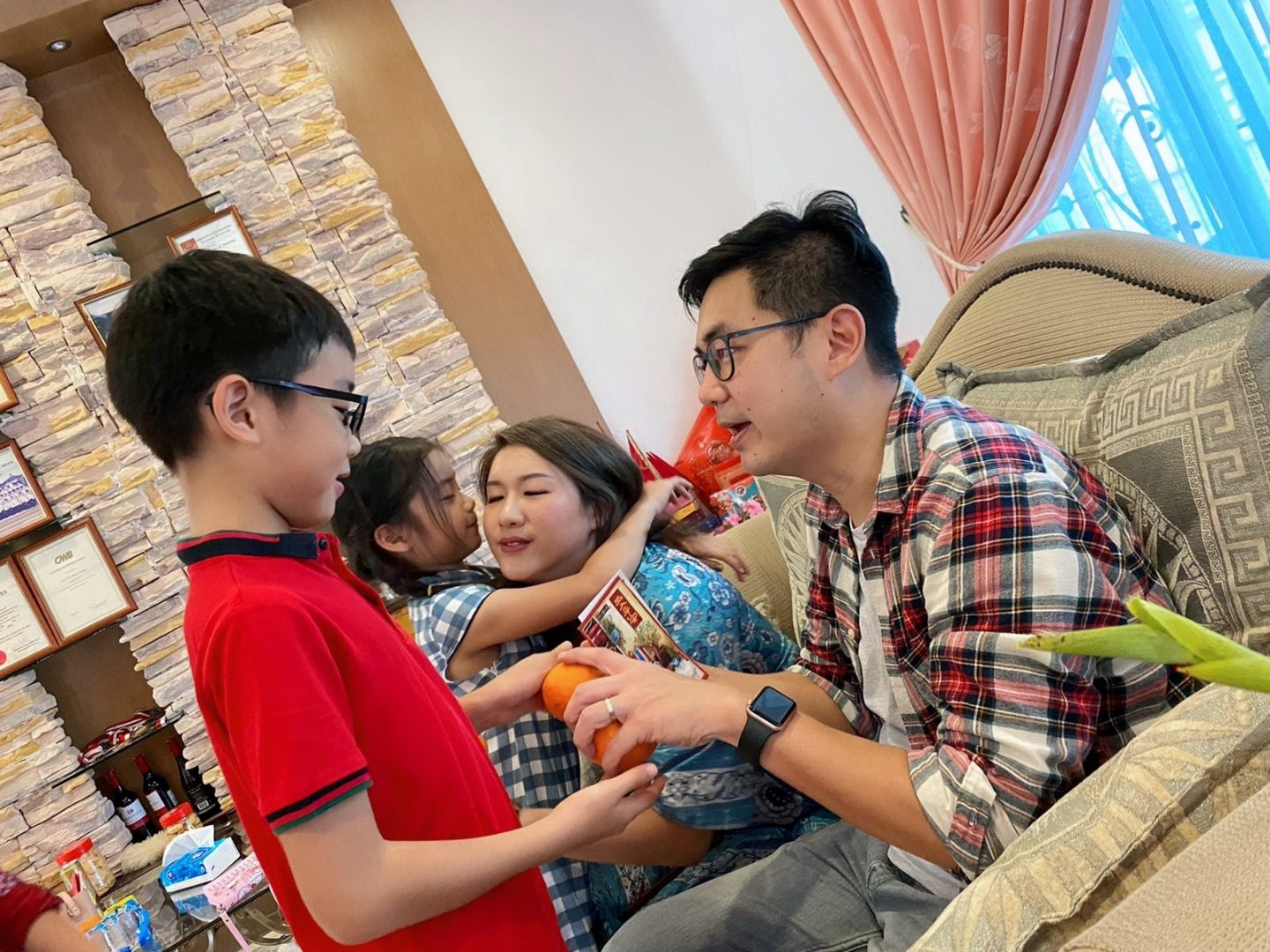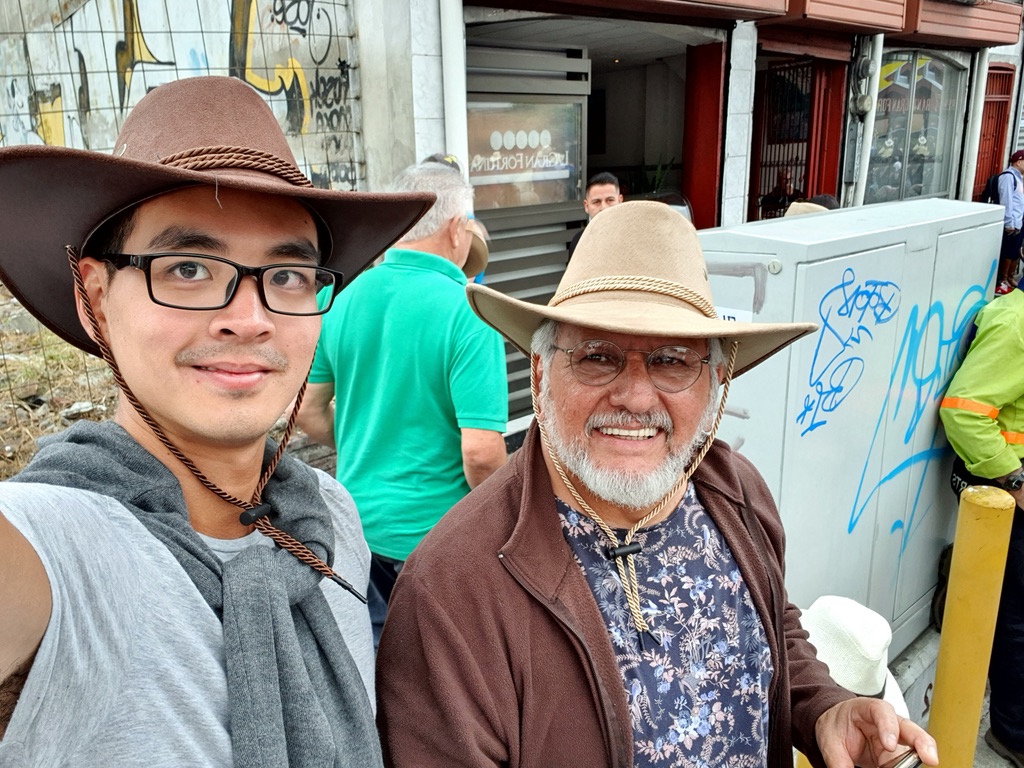‘Chopstick Vicar’ from Singapore breaking stereotypes and bridging barriers
by Janice Tai // September 4, 2020, 2:40 am
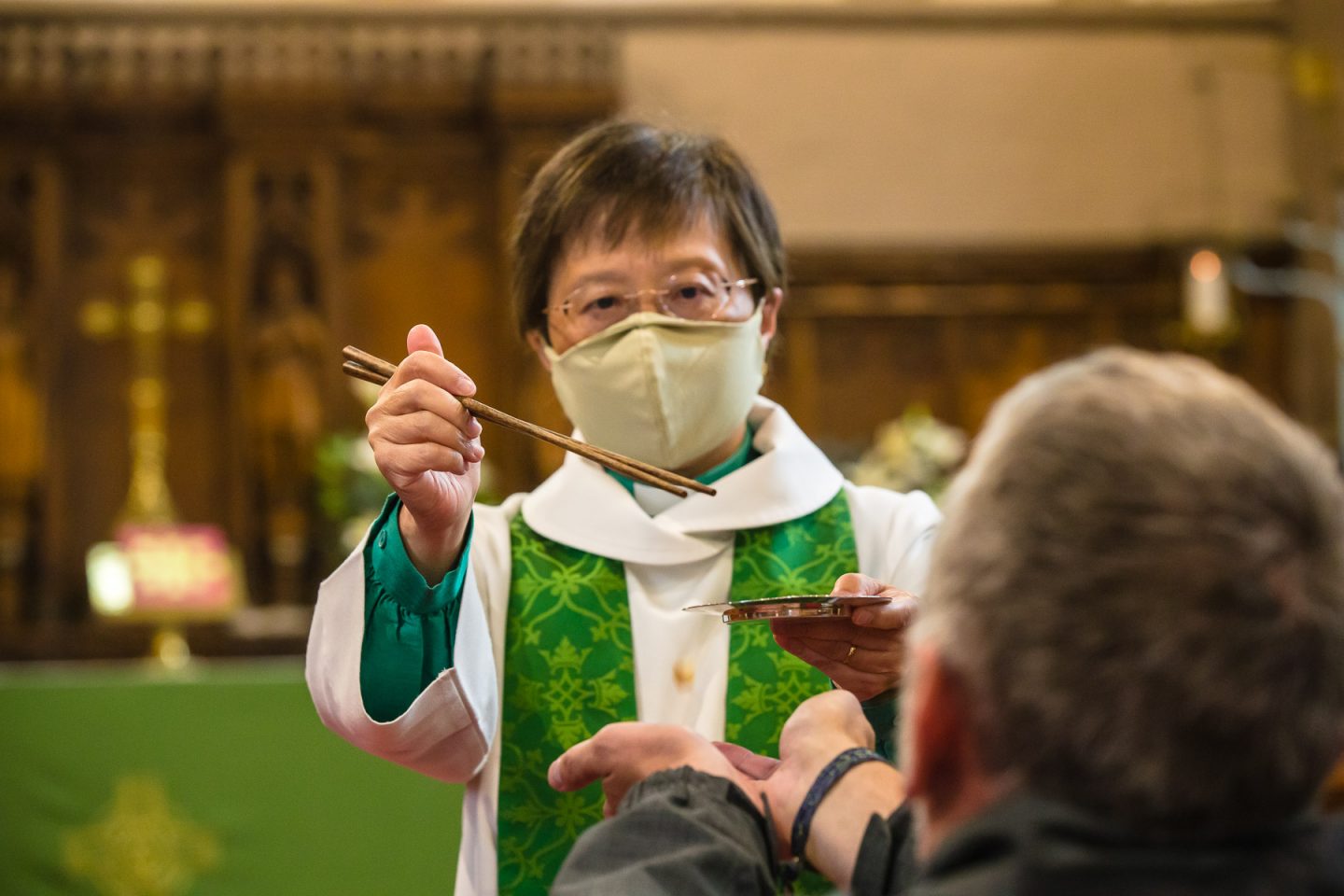
Rev Eileen Harrop administers Communion for her parishioners using lo hei chopsticks. All photos courtesy of Rev Eileen Harrop.
The UK-based Singaporean priest who had the global spotlight turned upon her after giving Communion with lo hei chopsticks last month said she may have been using the chopsticks wrongly, though that has not resulted in any major “bread accidents”.
“My handling of chopsticks is not ‘the perfect method’ so some Chinese might shake their heads at my imperfect example of handling chopsticks!” said Reverend Eileen Harrop wryly. The parish priest received attention worldwide after she was pictured giving Communion to her congregants with a pair of long chopsticks.
“The positive side of that is that it encourages anyone who hasn’t got perfect technique that they can still use chopsticks effectively!”
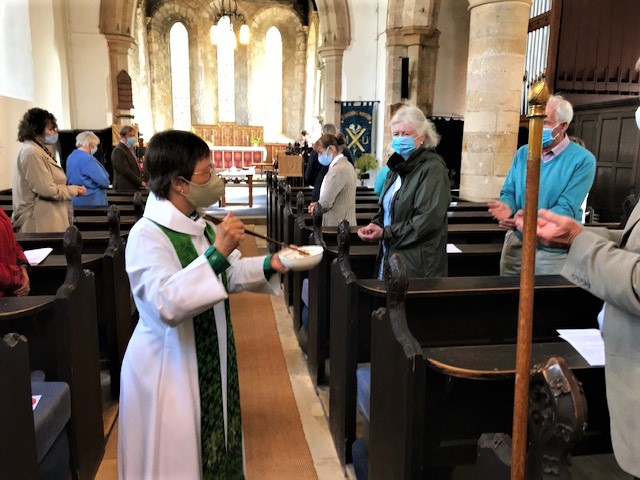
The ‘Chopsticks Vicar’ said this method of administering Communion helps her to keep the mandatory distance from worshippers at St Mary’s in Gainford, County Durham.
“The only time we’ve had bread ‘accidents’ is not due to my handling of chopsticks but the pieces of bread bouncing off parishioners’ palms when they held them out flat instead of cupping their hands as requested,” Rev Harrop told Salt&Light with amusement.
In UK, guidelines for safe distancing stipulate a preferred 2m or a minimum of 1.5m.
Baffled by the fame
Rev Harrop was featured on several major media outlets – such as the British Broadcasting Corporation (BBC) – in the United Kingdom and in countries as far as Poland and India earlier this month.
“There was gladness that I drew on my heritage to enable something important to be continued.”
In Singapore, Prime Minister Lee Hsien Loong shared on his Facebook page that Rev Harrop was making waves by coming up with “an unconventional (but effective!) way to give communion wafers to her parishioners while still observing safe distancing”.
“Happy to see that she keeps a little piece of home close!” wrote PM Lee, noting that Singaporeans can still practise their faith as long as everyone follows the necessary precautions.
Rev Harrop, who is among the few Southeast Asian women who serve as parish priests in England, said she was surprised and baffled by the sudden newfound “fame” but observed that it was good that the institution of the Church was being applauded for creating an environment where such safe practices could be followed.
“There are many who have had preconceptions about the Church, and non-believers were surprised that something of a different culture is welcomed by the Church of England.
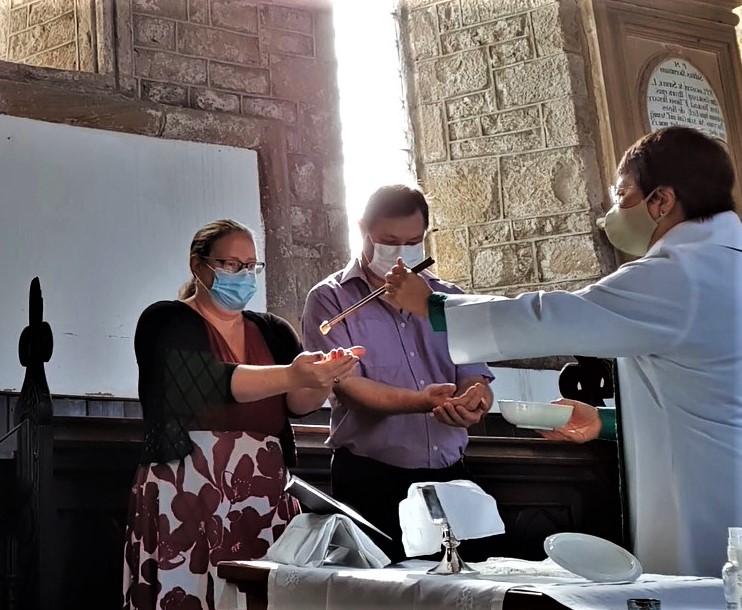
Her parishioners feel reassured with the safe distancing, said Rev Eileen Harrop.
“There was gladness that I drew on my heritage to enable something important to be continued.
“There was something ‘cool’ about being courageous, doing something that no one would have imagined for this purpose,” said Mrs Harrop, 61, who noted that her bishop was very glad that she had felt confident to carry it out.
Bridging cultural differences
At a time when there has been heightened awareness of racism and cultural discrimination, having a Chinese woman priest who dared to draw on her cultural heritage may have broken a few stereotypes.
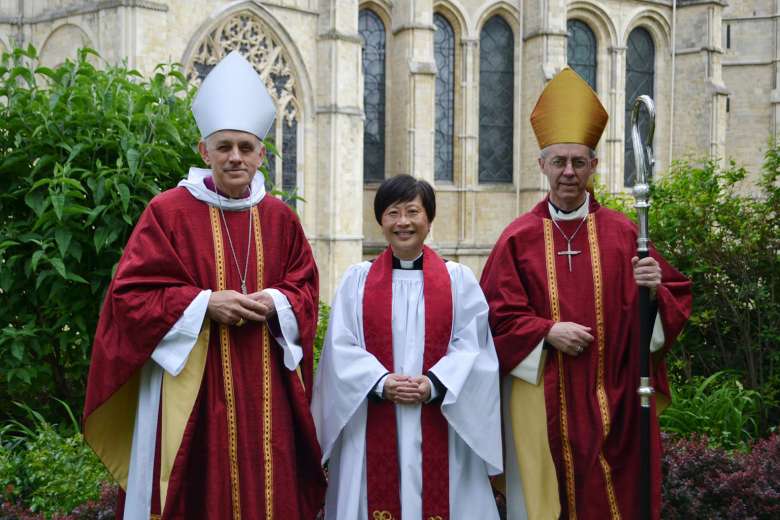
Rev Eileen Harrop’s ordination to priesthood.
On March 23, UK Prime Minister Boris Johnson announced a nationwide lockdown in a bid to stem the overwhelming numbers of coronavirus cases in the UK.
Four months after the lockdown, when church services were reopened, Rev Harrop decided to pilot the use of 46cm-long lo hei chopsticks to serve her church members Holy Communion in order to observe UK’s social distancing guidelines.
Her colleague had suggested using tongs to serve the communion but Rev Harrop thought those were too short to ensure a 1.5 or 2m distance.
“I am more confident in using chopsticks than tongs. There is also relevant significance of the lo hei occasion to Communion,” said Rev Harrop, who had tested the chopsticks out with different types of wafers and bread.
She had gone online to purchase two pairs of long lo hei chopsticks as the church might be using them for some time during the Covid-19 pandemic.
Lo hei and Holy Communion
The alignment of meaning behind the lo hei practice and that of the Holy Communion, said Rev Harrop, is the idea of koinonia, Greek for fellowship.
“The whole idea of lo hei reflects what Communion means to Christians as a body of Christ and in communion with one another. In Ephesians, Paul describes diversity within the body. All the colours and significance of each ingredient of lo hei is a reflection of such diversity as God intends,” said the vicar.
The alignment of meaning behind the lo hei practice and that of the Holy Communion is the idea of koinonia,
She has learnt that lo hei is not a traditional practice originating from ancient China. Instead, it was created by diaspora Chinese who found a means of kindling community.
It is an expression of reconciliation, harmony and unity among family and friends by acknowledging the blessings in food and a reminder to share joy in mutual generosity.
Rev Harrop recalled inviting friends to celebrate Chinese New Year in her home when she lived in North Moreton, a village in South Oxfordshire. The friends had lo hei with raw halibut. In one of her present parishes in Gainford, they had a social event during Chinese New Year and again she introduced the lo hei. Everyone was intrigued and wanted to take part in it.
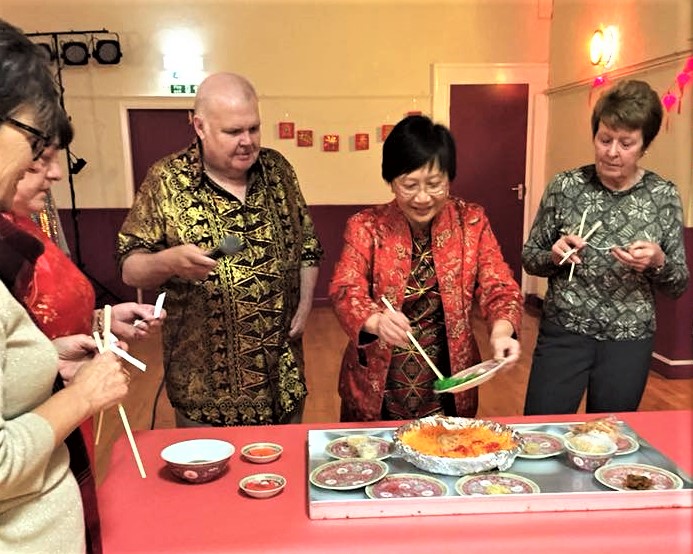
The ‘Chopsticks Vicar’ introducing her friends to the traditional practice of lo hei at a 2018 New Year Party in Gainford.
It has to be said that she also has her fair share of detractors who frown upon her Communion chopsticks.
“I’ve had a couple of negative comments that it is disrespectful to Christ – because I’ve used an implement for eating our meals to pick up ‘the body of Christ’, and that it lightens the tone of the most important sacramental act,” said Rev Harrop.
“But that’s out of ignorance about the Chinese culture and the nature of chopsticks and lo hei. It is more respectful in a way than using our fingers to handle the sacrament,” she added.
Conversation starter
The vicar, who left Singapore for UK in 1979, was ordained in 2012.
She serves at St Mary’s in Gainford, County Durham and at St Andrew’s in Winston.
Before becoming a priest, she was, at different times, a teacher, globetrotting management consultant, an entrepreneur, and a governor of a maximum-security prison.
Rev Harrop – whose maiden name is Eileen Chew – started her career as a teacher at Anglo-Chinese School (ACS).
She married her English husband, also an educator, whom she met during her undergraduate years in the UK. They settled in Singapore from 1989 to 1996.
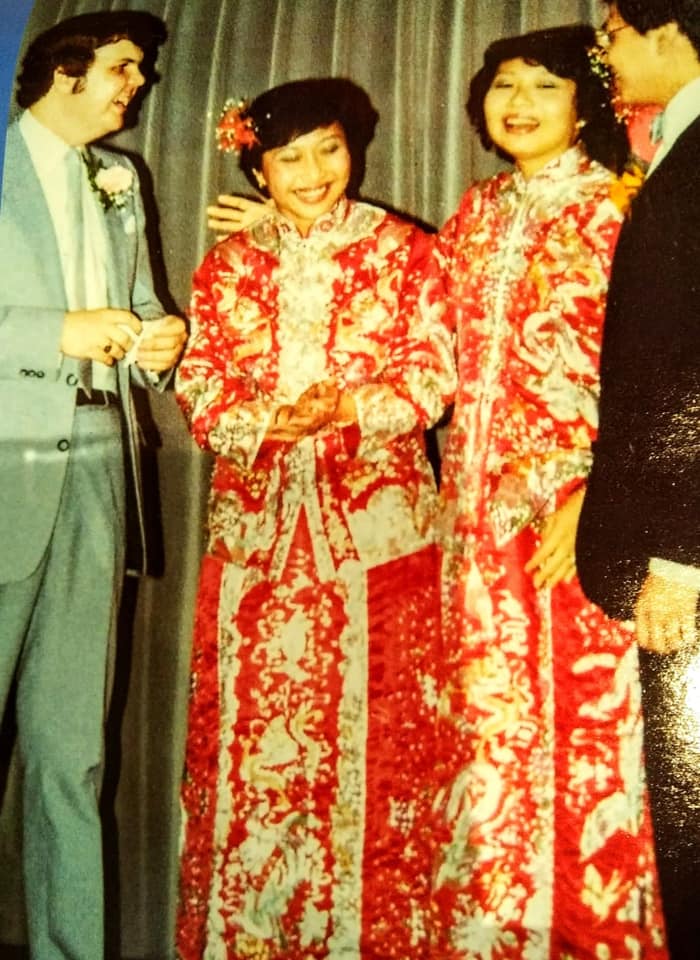
Rev Eileen Harrop with her twin sister and their husbands on their wedding night on August 11, 1985.
Before leaving Singapore, she had already switched careers twice. She left the teaching service to work with hospitals in the private sector, before being headhunted by a private company to be an organisation change consultant for quality management for multinational conglomerates (MNCs).
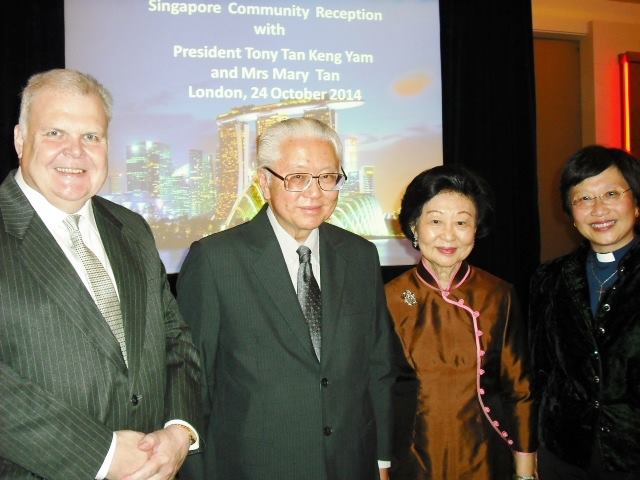
Rev Harrop and her husband, Brian, with Singapore’s former President Tony Tan and his wife, Mary.
She returned to the UK with her husband in 1996, when he needed to finish his PhD at Bristol University. They settled in Oxfordshire, where she continued her work with MNCs, until 2004.
The renewed interest is reassuring to her, given that social isolation has prevented some people from relating well to others.
She eventually set up her own consulting company but closed her business in 2007 when the frequent travelling and other professional demands started to wear her down. Her job search led her to become the governor of a high-security male prison in Leicestershire where all the inmates were on life sentences.
Two years later, she left the prison to become a consultant to the local government, but later felt God calling her to the ordained life.
In 2012, she was ordained by the Archbishop of Canterbury, and since then, has served several congregations.
Rev Harrop said she and her English husband, Brian, use chopsticks for some of their meals but not for all as they both enjoy a variety of cuisines. She misses local Singaporean fare such as char kway teow, nasi lemak, popiah, hokkien mee and prata, as well as seasonal festive foods like bak chang and mooncakes.
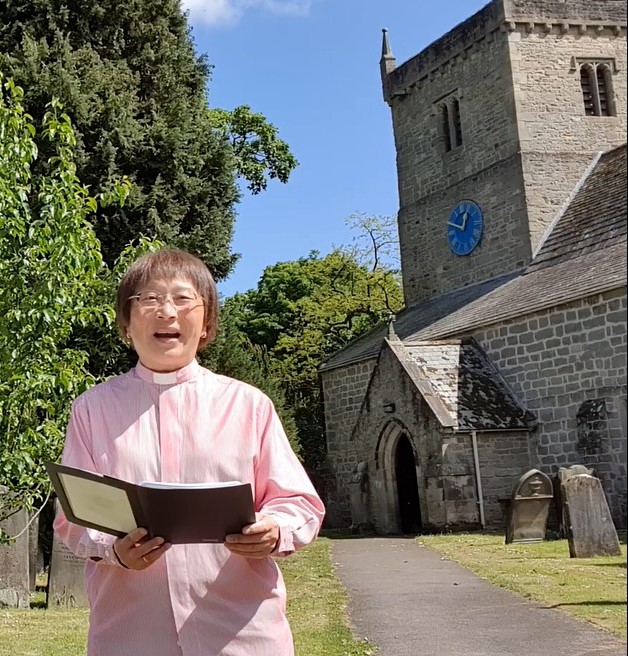
Rev Eileen Harrop outside her church earlier this year.
With the hundreds of thousands of people reading about her innovative way of distributing Communion while working within Covid-19 precautionary constraints, the vicar said it has opened doors to spiritual conversations with people who previously may have felt awkward speaking about faith or church.
“God certainly moves in mysterious ways! Many people have taken this opportunity to speak about church to me. They say, ‘Oh I saw that priest and we had a chat’ and people think it’s cool, not ‘churchy’ or particularly religious, but then actually we talk about Christianity because they go on to ask why I’m a Christian!” said Rev Harrop.
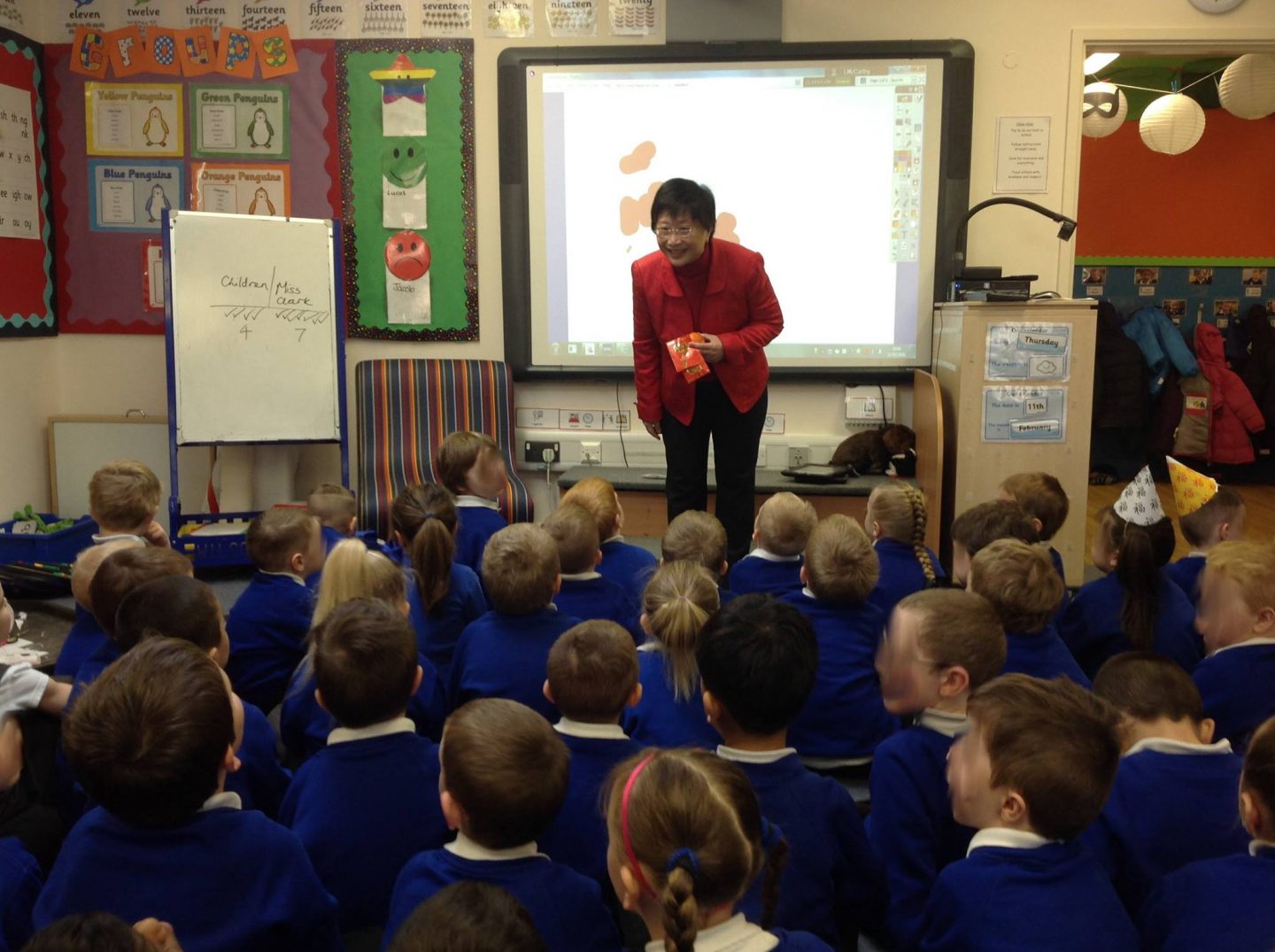
Rev Eileen Harrop speaking to British primary school children about Chinese New Year.
Such renewed interest is reassuring to her, given that social isolation during the pandemic has prevented some people from relating well to others.
“I questioned my role: What good is a priest who can’t be with her parishioners? I had to find new ways of being with them without being physically visible or close to them,” said the vicar, who lives and ministers in a rural area where not everyone has access to the Internet or mobile phones.
“What good is a priest who can’t be with her parishioners?”
The pandemic, however, did good for some in her community, as the elderly, vulnerable and housebound began receiving more attention.
“We had a system of ensuring each of them received help with groceries and other needs, and that they could join in church online and by weekly newsletter in exactly the same way as everyone else. They were not disadvantaged since everyone else also couldn’t attend church inside church,” she said.
For now, her parishioners who physically attend service in her church will continue to have their Communion bread passed to them with long chopsticks.
“As long as the threat and risk to parishioners is there, I’ll continue using them,” said Rev Harrop.
There is no chance of her being creative with serving the Communion wine, however.
“Wine is not administered at the moment because, in the Church of England, it must be from a shared cup, and it is not possible to do this – even with the most creative ways – given how the virus is spread.”
We are an independent, non-profit organisation that relies on the generosity of our readers, such as yourself, to continue serving the kingdom. Every dollar donated goes directly back into our editorial coverage.
Would you consider partnering with us in our kingdom work by supporting us financially, either as a one-off donation, or a recurring pledge?
Support Salt&Light
